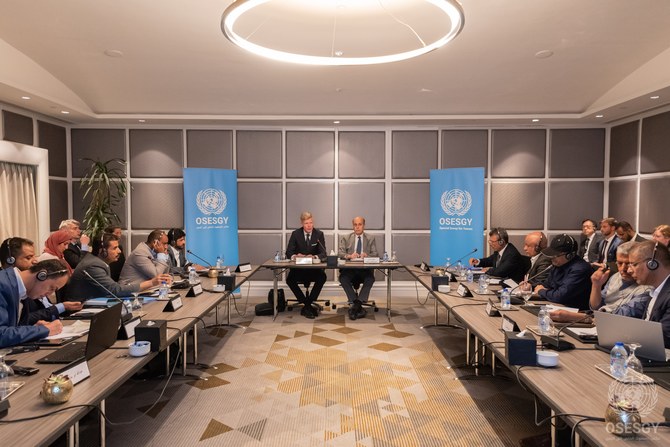LONDON: UN envoy to Yemen Hans Grundberg said on Wednesday that talks between the Yemeni government and the Houthi militia to reopen roads will be a collective victory for Yemen
“The parties are fulfilling a commitment they made under the truce to work on an agreement that will reduce the suffering of Yemenis in Taiz and other governorates,” he said.
“We want to support the parties in setting them on a path that would take Yemen out of a cycle of violence that has severely restricted people’s freedom of movement for more than seven years,” he added.
Representatives from the internationally-recognized government and the Iran-backed Houthis held a meeting on opening roads in Taiz and other governorates as per the truce agreement in the Jordanian capital, Amman, under the auspices of the UN envoy.
As part of the truce, the parties have also made important progress toward resuming commercial flights to and from Sanaa airport, the envoy’s office said, adding more than 1,000 passengers have traveled so far and the frequency of flights is increasing.
Preparations are now under way to resume flights between Sanaa and the Egyptian capital, Cairo, the statement added.
“This will allow more Yemenis to travel abroad to access medical care, educational and trade opportunities, and to visit family,” said Grunberg. “I am grateful to the government of Egypt for its cooperation on facilitating flights from Sanaa to Cairo and its active support to the UN’s peace efforts.”
Grundberg said he is also working to renew the current truce agreement, which is approaching the end of its two-month period on June 2.
“We have seen the tangible benefits the truce has delivered so far for the daily lives of Yemenis. The parties need to renew the truce to extend and consolidate these benefits to the people of Yemen who have suffered over seven years of war,” Grundberg said.
“The parties need to seize this opportunity, by implementing and renewing the truce and negotiating more durable solutions on security, political and economic issues, including revenues and salaries, to support a comprehensive political settlement of the conflict,” he added.
















